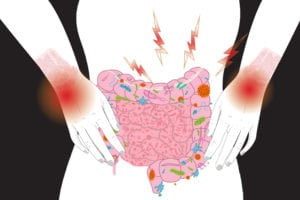Like most autoimmune diseases, rheumatoid arthritis (RA) is a bit of a mystery because the exact cause is unknown. There might not actually be one single cause; rather, many experts now believe that a variety of risk factors likely combine and lead to the development of RA.
Some of these risk factors — such as family history, smoking status, and weight — have been well-known for a while, while others still require more exploration. In recent years, researchers have been examining the role of antibiotics and the onset of rheumatoid arthritis. Some patients report that they’re more apt to experience flares while taking these drugs, yet others note that they seem to help ease their RA symptoms. While research in this area is ongoing, one new study suggests that people have taken antibiotics are more apt to develop RA in the first place.
To conduct the study, which was published in the journal BMC Medicine, researchers used a large British health database and identified 22,677 people who had been diagnosed with RA between 1990 and 2017. They then compared them to a larger (90,013) group of healthy controls who did not have RA.
“The odds of developing RA were 60 percent higher in those exposed to antibiotics than in those not exposed,” the authors concluded.
These findings do not mean that antibiotics directly cause RA, but whether the drugs might somehow increase the risk is worth further study. Antibiotics don’t only kill infection-causing bacteria; they also kill “good” bacteria and other microbes in the gut, which might increase the risk of other infections and autoimmune illnesses (including RA).
Also worth exploring is whether the underlying infections that prompt someone to take antibiotics might predispose someone to RA. In this study, respiratory infections were most apt to be associated with the later development of the disease.
“Although we have identified a strong association between antibiotic usage and the onset of RA, there remain many unanswered questions, particularly whether this is related to infections themselves, alterations in the microbiota [which is the mix of bacteria and other microbes in the body], or a combination of the two,” the authors wrote.






